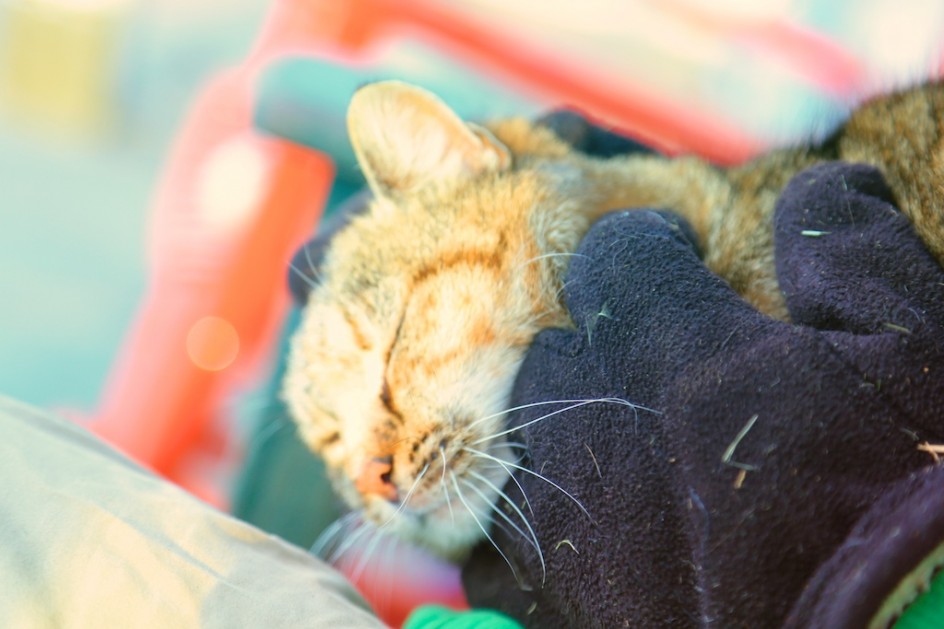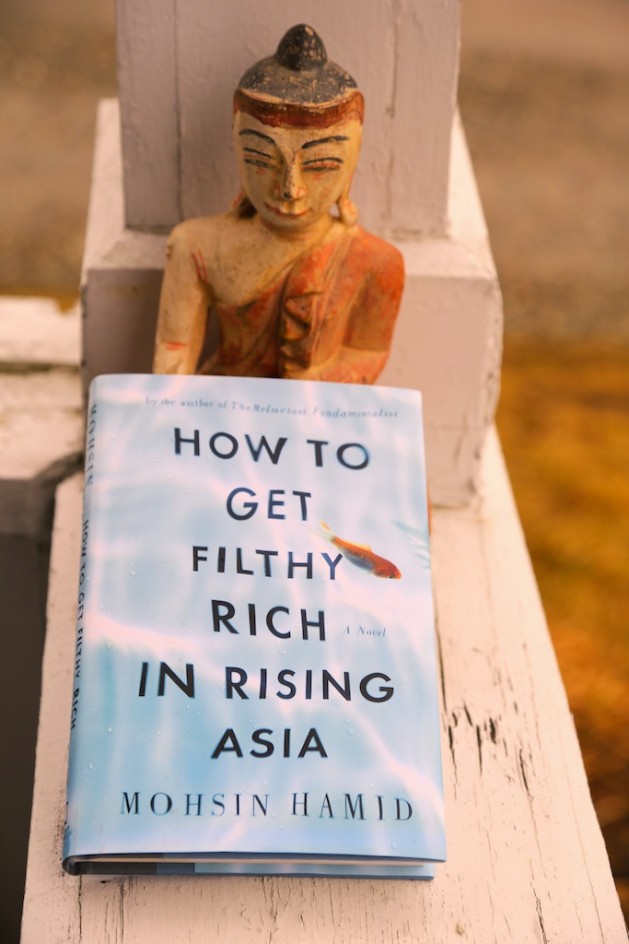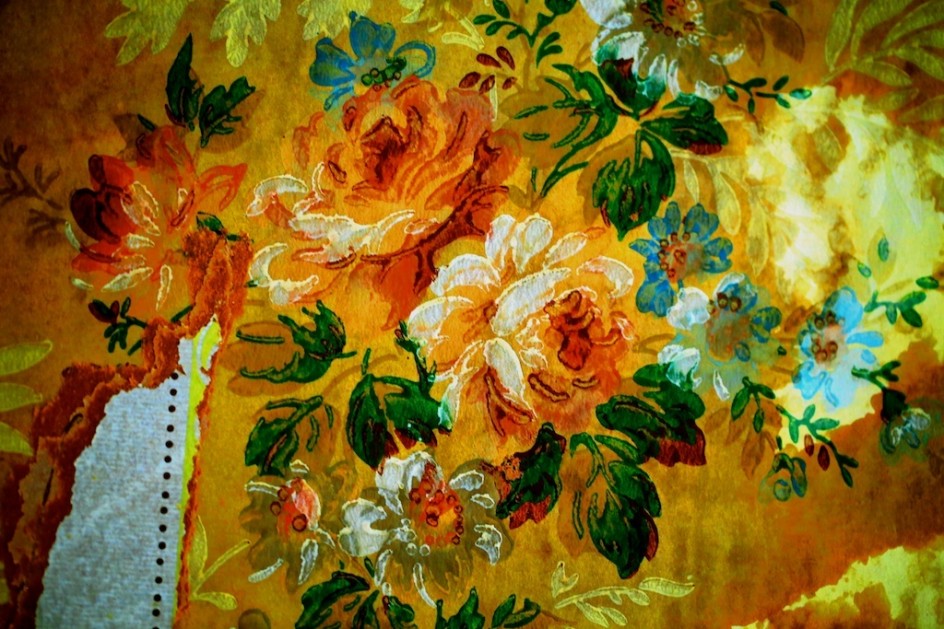
After the chores in the morning, Flo hops up onto the rocker where somebody is happy to scratch the back of her neck and ears. Today, Maria. Tomorrow, me.

If you want buy this book, please consider buying it from Battenkill Books, my local bookstore, or you own independent local bookstore. These reviews are done in conjunction with Battenkill and part of the exciting work Battenkill and I are doing together to keep bookstores and writing vital. Don’t let anybody tell you bookstores are dead. Connie is having a great year. You can call the store at 518 677-2515 or e-mail Connie Brooks at [email protected] or visit the store’s website. They take Paypal and ship anywhere in the world, and thanks for supporting this great store and independence, individuality and human contact.
___
I watch in bewilderment and surprise as America’s Frankenstein Monster – capitalism, corporatism and greed – have been embraced with stunning enthusiasm and success in the region of the world author Mohsin Hamid calls “rising Asia.” These ascending capitalist Third World nations seem to have grasped the greed and exploitation part, but overlooked the darker sides of the American experiment – dislocation of family, violence, the destruction of good jobs and decent wages, the corruption of politics, the obliteration of culture, horrific damage to the environment and of rural life and community.
This is the subject of Mohsin Hamid’s (The Reluctant Fundamentalist) second novel, How To Get Filthy Rich In Rising Asia, (Riverhead.)
Mohsin Hamid has written a new kind of Horatio Alger story right out of rising Asia. This is a riveting and very timely journey of a nameless striver from impoverished rural village child to corporate tycoon in a Mumbai-like city. Soon after his family moves to the big city to find work, the striver figures out that in a world whose water is being polluted more and more by the hour – there is no environmental regulation and bribes get contractors permits to build anywhere, even over aquifers – water has got to be a valuable commodity. He pumps some out of the ground, boils it, and sells it to the anxious nouveau riche in their condos. His rise is marked by violence, corruption, bribery and raw nerve, the new skills of rising Asia’s business community. Everywhere the striver goes – even in his new mansion – there are guards with assault rifles and cement barriers guarding rising Asia’s new titans. The rich in rising Asia need a lot of protection from the poor who surround them.
Despite his wealth, the striver’s heart is really set on something else – the also nameless pretty girl whose success occurs parallel to his, their paths crossing and recrossing, their lifelong affair frustrated time and again by the same forces that pull their careers along. Rising Asia is a mad, out-of-control place, it’s economies growing so rapidly they tear through the culture like Tsunamis, obliterating just about everything in their place. Centuries old traditions and patterns of life are destroyed overnight, millions flee impoverished villages to help Asia rise, and the whiff of corrupt bureaucracy makes almost anything possible but rational growth.
Hamid was smart to keep his protagonists nameless, this works to make them both universal metaphors for the human spirit and yearnings that underly even greed and great success. As the striver is enveloped by the very forces that made his success possible, we see that all he ever really wanted was a life with the pretty girl, and all she ever really wanted was him. I thought the ending was pitch perfect.
The story of one man’s rise in the new economy is compelling enough. The striver guessed right about water, but his instincts may have initially failed him when it comes to life. He had plenty of money, but always wanted something more, so the story becomes touching, poignant even as it reveals so much about the new global economy and what it has done to us and his own conclusions about life. This book is rich and evocative and skillfully crafted. It is political without preaching, romantic without ever being sappy, and we are also reminded of the terrible cost nations and communities have to pay to be rich American style. In this country, we are just beginning to grasp our own limits. No one in this version of rising Asia yet believes there are any. Like Marquez and Naipaul before him, Hamid finds the collision of the old and new worlds the richest imaginable vein for great fiction.
_
If you buy this book from Battenkill Books, the store will send you a surprise gift. 518 677-2515.

Our wonderful friend Mary Kellogg – published poet and a beloved witness to my life with Maria – came by to say hello today. She brought us the gift of some new poems and did some bonding with Red. We loved the poems – what a treat to hear them – and I asked Mary if she was up for her third book of poetry. She looked at me with her quizzical eye and smiled. “Maybe so. You think it’s time?” I do. Mary’s first two volumes – My Place On Earth and Whistling Woman – bold sold through several printings. Mary started writing poetry when she was eleven, and she just had her 83rd birthday. She lives on her 30 acre farm and takes care of mostly by herself. She is aware of aging but does not surrender to it or take it too seriously.
Mary and I have been friends ever since she visited me with a group of girlfriends at Bedlam Farm and showed me some of her poems. I was the first person other than herself to ever see them and Maria and I went to work getting them published, one of the happiest experiences of my life.
She plans to die in her house, on her farm, she said. It will happen. I hope Mary writes some more poems, I would be very proud to publish volume three of this remarkable person’s work. Talk about strong women.

I am grateful for rural life, for community, where buying local is not a sticker but a way of life, an affirmation of values, a series of human connections. I’ve shared the challenges of my life – a professional writer recently divorced who owns two farms in the midst of a publishing revolution, a recession, and real estate collapse. This is not a complaint, I see it as a creative and personal challenge to adapt, change, be strong and remain successful and relevant. I will do those things or perish trying. Me and Lord Nelson.
This all has upended my financial life. I have to say I am so lucky that I find myself in this rural area with a bank and a banker who cares about me and Maria, is helping me through this transition. My banker comes to the house and sits down and talks to Maria and I. He explains the options we have, the ways the bank can help us. He makes clear that the bank – they have the mortgages on both farms – is in it with me for the long haul. They are confident Bedlam Farm will sell – it’s a great property at a great price my banker told us – and they want me to talk to them and let them know how things are going, how they can help.
They are familiar with my work. They like my plan for making the transition from a paper book writer to a paper book writer with a red-hot blog and a strong social media presence. “You will be fine, we are not worried about you. What can we do to help?” I can hardly believe this when I hear it, it seems no one ever asks me that and means it. I appreciate that, it means a lot to me, and they are right. They don’t have to worry about me. I will get there. In this impersonal and fragmented world, a world of phone trees, online applications, text messaging, my bank is very human, very personal. We know Bob well. He knows our house, our dog, our work. He understands my life. We enjoy his visits very much, and who says that about their bankers?
Bob visited us this morning. We talked about real estate, credit lines, the uptick in home sales. We all feel pretty good about selling Bedlam Farm this Spring.
Much of the country’s economic and political system has abandoned rural life, as Wendell Berry has written so poignantly. Most of the country is not considered efficient in the global economy. Human connection is disappearing. Banks exist to make money, and I don’t romanticize them. I’m concerned with money also. But lots of people are going through great transitions right now and I am especially grateful I live where I live, where it is still possible for a bank to make money and care about the individual lives of the people they serve. I could complain and say I weren’t going through all of these challenges. I use to. I have learned not to do that.
I am grateful for Bob and his bank, for giving me the support and encouragement – and the money – that gives me the time and the opportunity do my work and come out the other side.

Florence Walrath lived in the time before corporations took over holidays and turned them into marketing opportunities. Christmas meant something to her and her family. This was one of the many values that revealed themselves again and again in her journals. Christmas was an intimate ritual, a family time, no rush to the mall for bargains. In these journals, we see what we have gained, we see what we have lost. Florence lived to be 104, and she saw her world change. She never complained about that in her journals, as older people often do, she seemed to accept life as it found her. And as she wished to live it.
“There is the memory of Christmas at school with a trip to the woods to pick out a tree, after our lessons we made all kind of trimmings from red and green paper. We strung popcorn for a chain, put bells and lots of pine and cones around the room, also windows. There was a special charm once the lamps were lit. “No electric lights.” Our parents all came. We each had a part in a play or a piece to speak. I spoke mine either too fast or so low no one could hear me.
Of course we tried to sing the Xmas songs. W had no good singers but we did try. What a relief when that was over and Santa came. We each received Xmas candy, each one got one thing besides the candy, sometimes a book, crayons, pencils or perhaps a hair ribbon. It was a happy time never the less.
Christmas at home was mostly small things. My mother made cloths for us, an orange in the toe of our stocking was really a treat. As we became older I remember Fayette got a boughten sled. I was told I could have one when my turn came and I did. The grandparents came for a big dinner. We always had a freezer of homemade ice cream. Boy, could Mom make good ice cream. When I was old enough I turned the crank and mother would give me the dasher from the center when I was done. Gee, I got to eat what ice cream was on it. Of course the boys liked to help with that part, which annoyed Mom.”
Next: Life at school